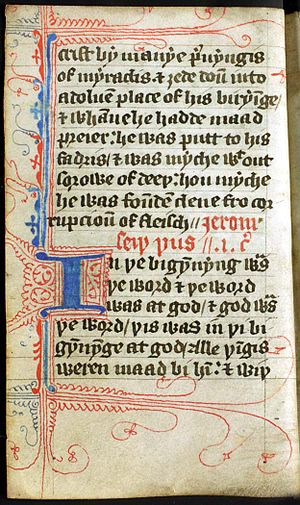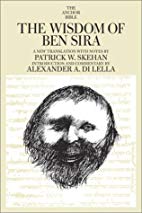It seems almost trivial to write a post based upon John Ashton’s discussion (Understanding the Fourth Gospel 2nd ed.) of the theological links between the Wisdom of Ben Sira (Ecclesiasticus) and the Prologue in the Gospel of John, given the depths he explores throughout the gospel. But even though it’s only a pimple on a much larger discussion, I found it interesting enough (and short enough) to write about anyway.

Most of us know the Prologue of John well enough. The Word was with God in the beginning, become flesh, rejected by his own, finds a place among his disciples, . . . .
But first, a select look at Wisdom (a “she” in the OT) in the pre-Christian Jewish literature:
In the Jewish Scriptures (Christianity’s Old Testament) and noncanonical writings, Wisdom appears as a feminine figure who is a favourite of God.
Wisdom is speaking in Proverbs 8:30
Then I was by him, as one brought up with him: and I was daily his delight, rejoicing always before him (or God’s “darling and delight” and “playing in his presence continually” in the NEB).
Ashton believes that this playful feminine figure appears in the guise of the masculine and more severe figure of the Logos, the Word, in the Gospel of John. But how? What was the stepping stone between the two, since the gulf seems too great to have been reached in a single leap?
John Ashton sees the link in Ecclesiasticus, or the Wisdom of Ben Sira, or of Jesus the Son of Sirach.
By an amazing leap of theological imagination he had identified Wisdom, who had ‘come forth from the mouth of the Most High and covered the earth like a mist’ with the book of the covenant of the Most High God, the law which Moses commanded us. (p. 503, Understanding)
Thus Sirach 24:3
I came out of the mouth of the most High, and covered the earth as a cloud/mist.
and 24:23
All these things are the book of the covenant of the most high God, even the law which Moses commanded for an heritage unto the congregations of Jacob.
Note, of course, how John’s Prologue swaps the law of Moses with the Logos. (For the Law was given through Moses, but Grace and Truth came through Jesus Christ.)
Earlier in Sirach — 24:4-7
I [Wisdom] dwelt in high places, and my throne is in a cloudy pillar.
I alone compassed the circuit of heaven, and walked in the bottom of the deep.
In the waves of the sea and in all the earth, and in every people and nation, I got a possession.
With all these I sought rest: and in whose inheritance shall I abide?
Then Sirach 24:8
So the Creator of all things gave me a commandment, and he that made me caused my tabernacle to rest, and said, Let thy dwelling be in Jacob, and thine inheritance in Israel.
Compare also with John’s Prologue
Sirach 24:9
He created me from the beginning before the world
and in another apocryphal writing, the Wisdom of Solomon 9:4
Give me wisdom, that sitteth by thy throne
When Wisdom, who had dwelt from the beginning with God, entered the world as the Law and God’s special gift to Israel, she (Wisdom) began to have a history. But that history was essentially one of “incomprehension and rejection”. (p. 504)
Compare the themes above with those in the Prologue of John:
- The Word (Logos) dwelt from the beginning with God, as did Jewish Wisdom
- The Word was sent by God to the earth, as was Jewish Wisdom
- The Word thus came to God’s own (Jews) but it did not find a dwelling place, as Wisdom also came to God’s own (his creation – all races)
- But God did grant a few to welcome the Word to make its home among them, just as God gave Wisdom as a special gift to Israel.
- The Word tabernacled among men, as Wisdom also tabernacled on earth.
- The Word suffered rejection and disbelief, as did Wisdom.
And beyond John’s gospel
Sirach also resonates with other Wisdom passages in gospels other than that of John.
Sirach 24:33
I will yet pour out doctrine [teaching] as prophecy, and leave it to all ages for ever.
Compare Luke 11:49
Therefore the Wisdom of God also said, “I will send them prophets and apostles, and some of them they will kill and persecute.”
and Mattew 23:34
Therefore, indeed, I send you prophets, wise men, and scribes: some of them you will kill and crucify, and some of them you will scourge in your synagogues and persecute from city to city.

Many scholars have seen the above Lukan passage as a very early strata of a Christian saying because of its link with personified Wisdom, and believe Matthew “modernized” the saying (not from Luke, but from the same source Luke used for the passage.) That is certainly a plausible explanation in its own right, but when we compare the above theological ambience of Sirach with the Gospel of John, which many scholars declare to be the latest written gospel, the question of the age and source of the Lukan passage (being very primitive) is not necessarily so secure. Especially so if we take note of those scholars who argue Luke antedates John. It is not unthinkable (though I do not have the Greek skills to argue the point in depth) that the Lukan passage shared the lateness of John’s — with John developing a theology of identifying Jesus with Wisdom, and a second-century Luke (or at least a Lukan redactor who also wrote Acts) attempting to tie bits of John with the other gospels as and where he found it possible to create a more “catholic” (and anti-Marcionite) gospel grounded in “Judaism”. (See my notes on Tyson for details.)
Neil Godfrey
Latest posts by Neil Godfrey (see all)
- Samaria in the Persian Period - 2024-04-15 11:49:57 GMT+0000
- No Evidence Jerusalem/Judea had a “Writing Culture” in Persian times — Israel Finkelstein - 2024-04-12 09:45:34 GMT+0000
- Questioning the Hellenistic Date for the Hebrew Bible — continuing - 2024-04-11 20:54:16 GMT+0000
If you enjoyed this post, please consider donating to Vridar. Thanks!

Great post. Thanks!
I thought you might be interested in learning about OUR Jewish traditions, one which has embraced the real Christ of the gospel, the Law and the prophets.
If this doesn’t interest you, I apologize in advance.
If you are interested let me tell you that we are the Frankist Association of America. One of our members has a new book out:
http://www.amazon.com/Real-Messiah-Throne-Origins-Christianity/dp/1906787123/ref=sr_1_1?ie=UTF8&s=books&qid=1245892844&sr=8-1
I am not that I am trying to sell you something. If you can’t afford the book you can see the website of one of our teachers – http://www.stephanhuller.blogspot.com.
I just wanted to let you and the scholarly world that there have always been more than one type of Judaism in the world at any one time. Some forms of the faith had to learn to hide their beliefs in order to survive and perpetuate themselves.
Shalom, God Bless
Everything is perfect with God
Beth El Jacob Frank
What is Huller’s explanation that the Gospel of Mark says the Herodians sought to kill Jesus? (I ask because I see from one of the pages you linked that your group believes Herod Agrippa was the Christ according to Mark.)